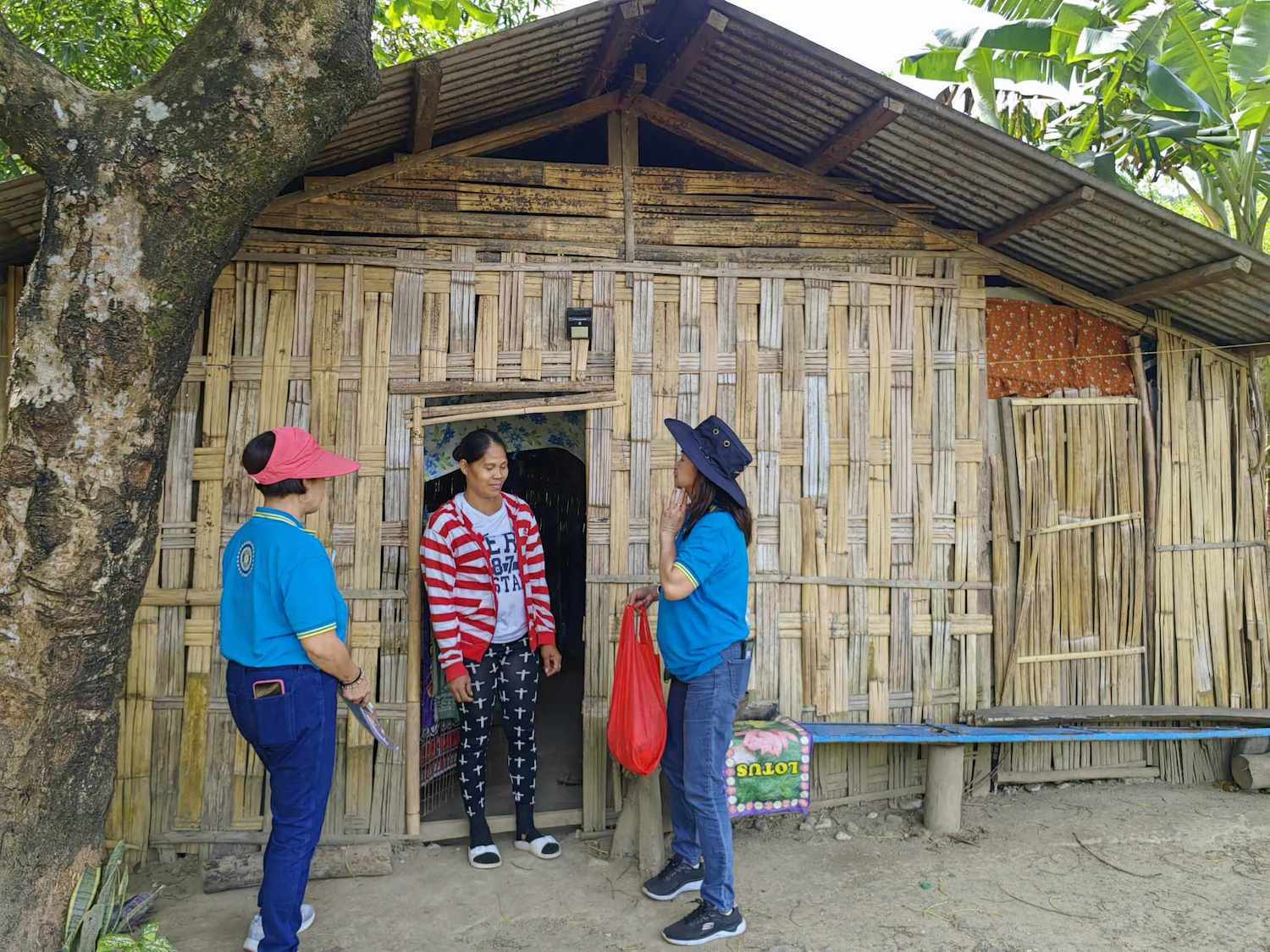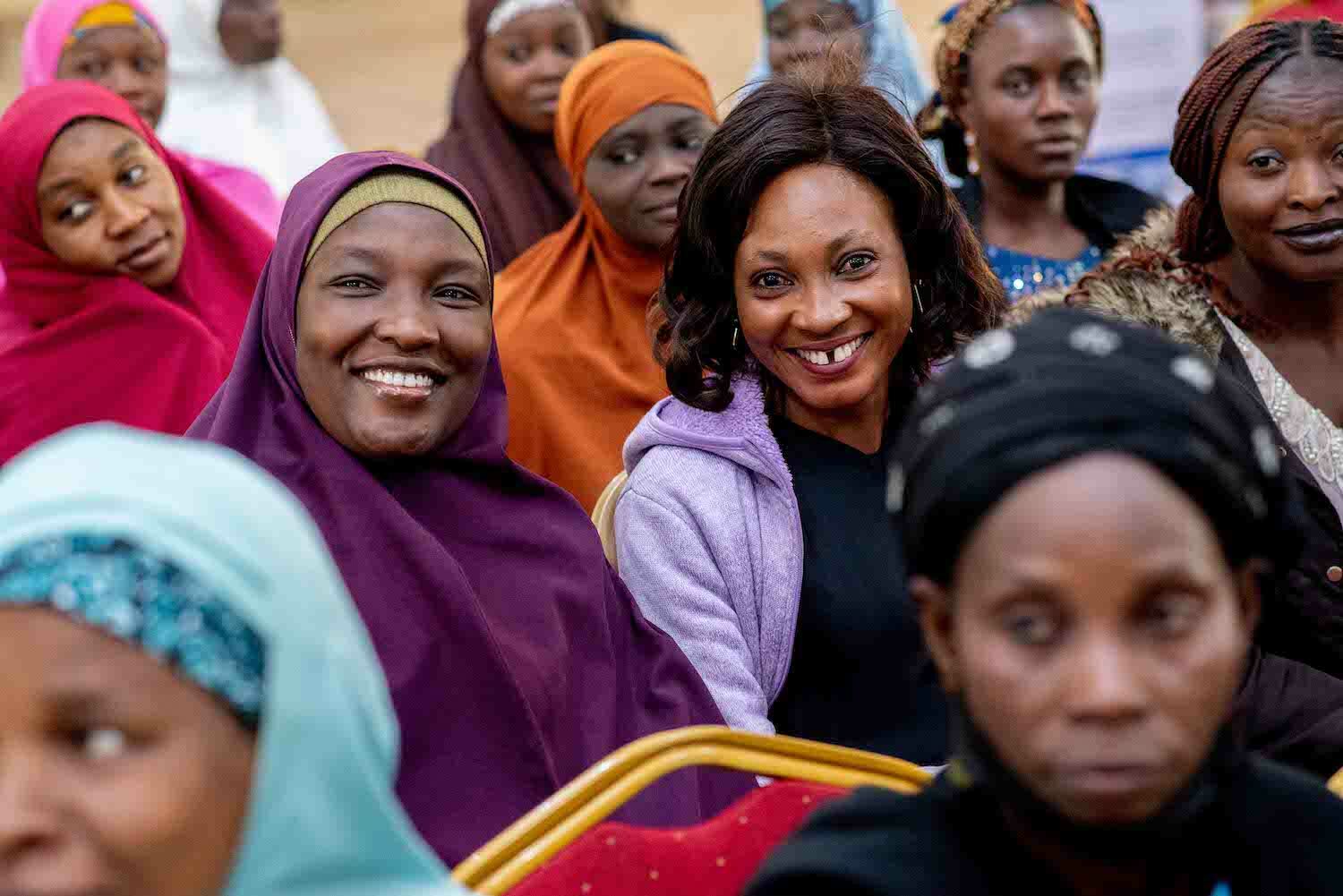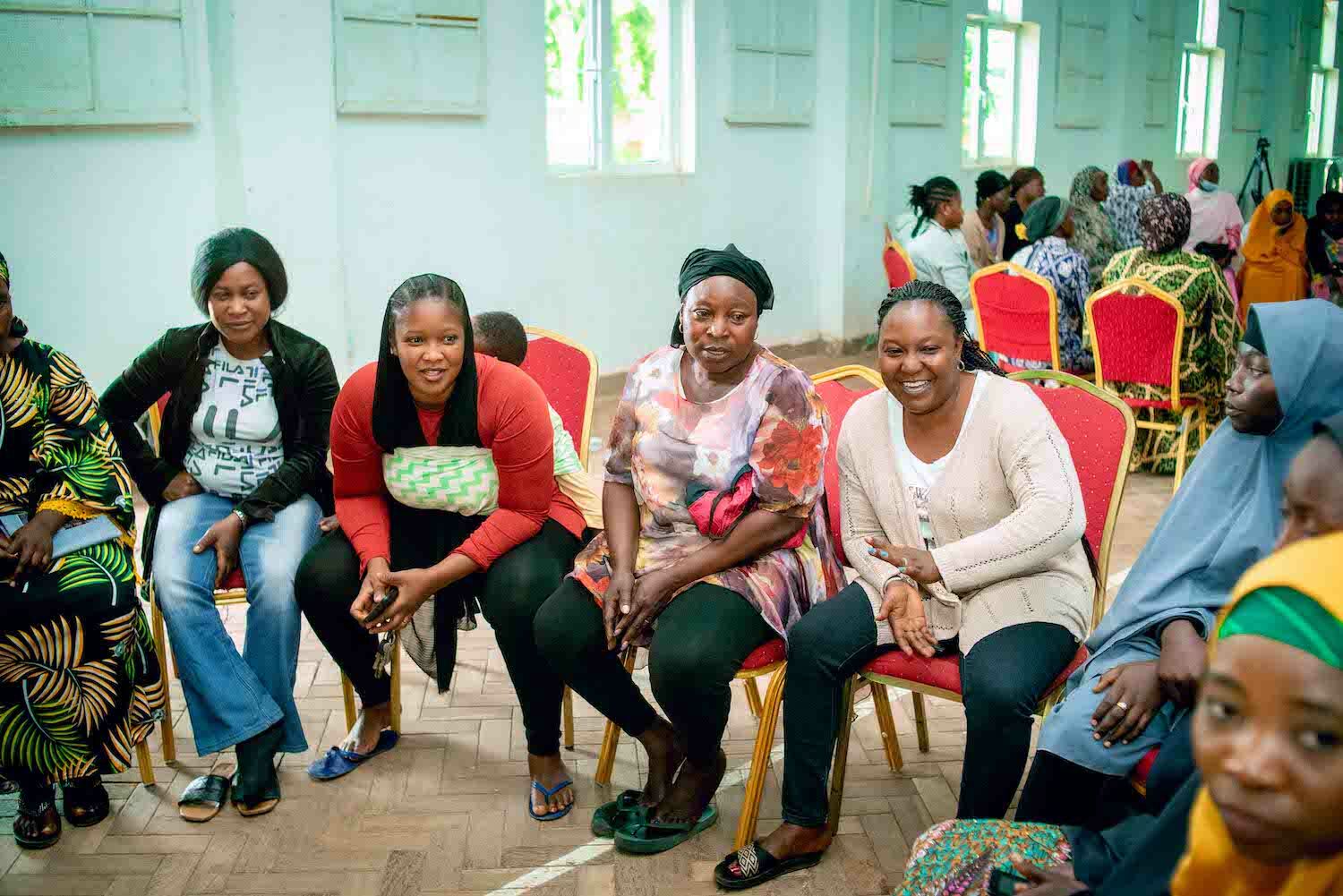Dr. Hyun Jin Preston Moon, founder and chairman of the Global Peace Foundation delivered the following address at the Global Peace Economic Forum 2017 held during the Global Peace Convention 2017.
Universal principles and shared values advanced by innovative political, civic and business leaders must undergird a nation’s policies and direction to support vibrant economic growth and prosperity. National economic policies in the region should promote and protect such values, while strengthening an environment to ensure growth and broad access to resources and opportunities for an expanding array of new entrepreneurs. Speakers addressed how these principles affect national transformation and unlock market capital, while fostering peace and stability.
ASEAN Renaissance: Unleashing Entrepreneurial Power for Peace and Prosperity
Your excellencies, distinguished guests, ladies and gentlemen:
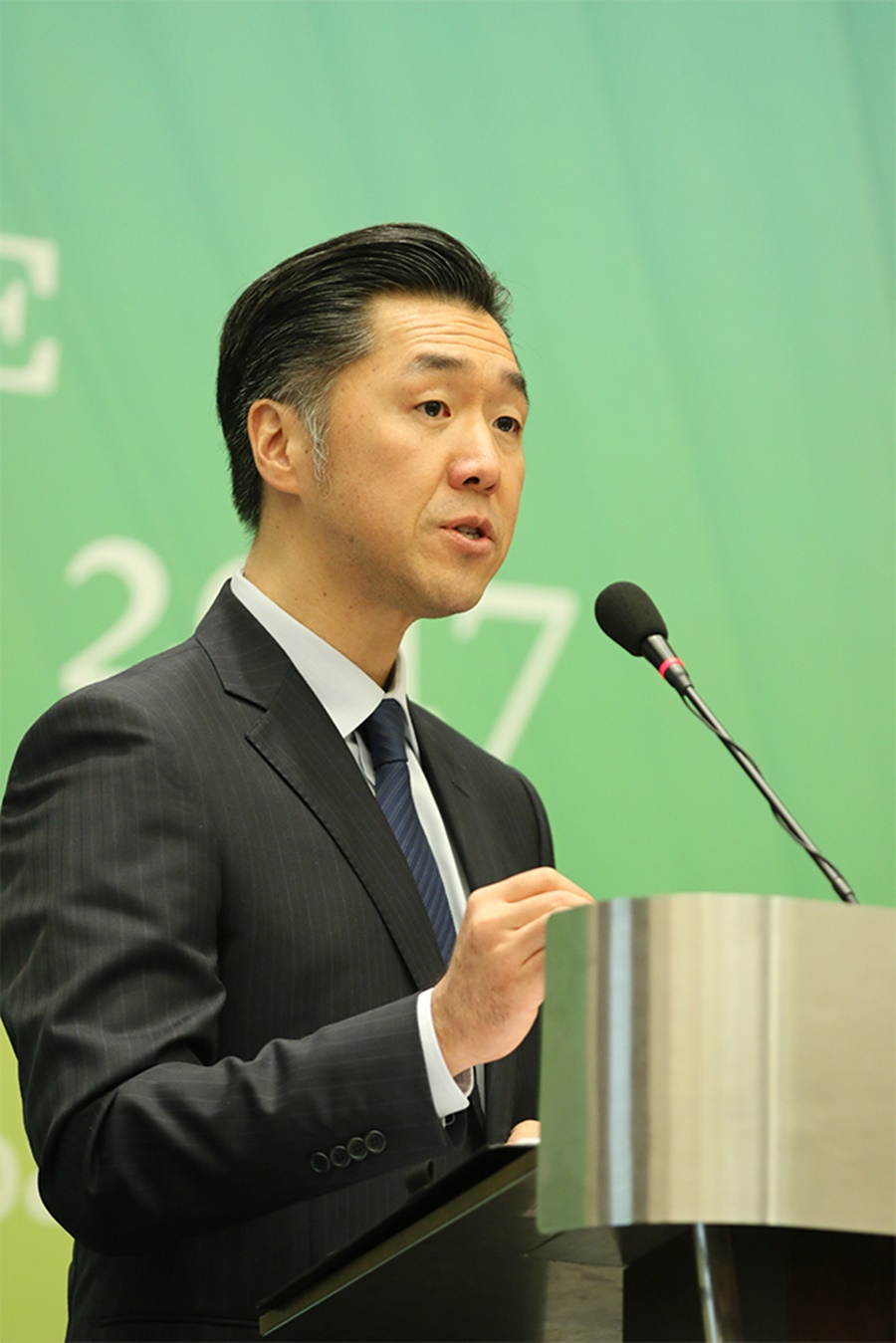
Dr. Hyun Jin Preston Moon, chairman of the Global Peace Foundation addresses the Global Peace Economic Forum 2017 held during the Global Peace Convention 2017.
It is very meaningful that we are convening this second Global Peace Economic Forum here in Manila.
This is indeed a crucial time in history, as evidenced by major events across the world: the elections here in the Philippines and in the U.S.; the impeachment crises in South Korea and Brazil; the war against terror and identity-based conflicts; the existential threat and instability presented by North Korea; and many more.
It is precisely at such times that a clear vision and exemplary leadership are needed.
I would like to thank the host nation of the Philippines for its hospitality, and its leaders for their genuine commitment to partnering with the Global Peace Foundation to strengthen peace and prosperity for the region and the world.
The timing could not be more appropriate as the Philippines has assumed the ASEAN chairmanship during its historic 50th anniversary year.
Also thanks to the organizers and supporters of this forum, including the Chamber of Commerce of the Philippine Islands, its President, Mr. Jose Yulo, as well as the former Managing Director General of the Asian Development Bank, Mr. Young-Hoi Lee.
I especially want to recognize former President Vinicio Cerezo of Guatemala, and former President Nicolás Ardito of Panama for joining us here today.
Finally, I want to thank all of you for your participation in this forum. Let us give everyone a warm round of applause.
Free Markets vs. Centralized Bureaucracies
I believe the last century put to rest the “age-old” debate of whether a centralized system or the free market is the way toward economic success. Even former communist nations that still maintain a single political party system have made significant efforts to liberalize their economies to take advantage of what free markets can offer and centralized ones cannot – a highly vibrant, entrepreneurial and competitive environment that delivers goods and services with maximum efficiency.
Just as Adam Smith observed in his Wealth of Nations two and half centuries ago, the “invisible hand” of free market aligns one’s self-interest to the greater good of society through competitive forces.
The truth espoused in classic liberal economic theory is very simple:
the freer the markets, the greater the efficiency and vitality; conversely, greater regulation and centralized control create inefficiencies and stifle growth. To promote innovation and entrepreneurism, governments and their leaders must begin by building freer markets.
However, in today’s highly politicized world, especially in the West and the more developed Asian nations, many markets have moved toward more regulation and government oversight, losing touch with market-oriented economic principles.
This is highly ironic in that the meteoric rise of the Western hemisphere over the last four centuries was due to these classic ideals. While the East was trapped in a rigid social, agricultural caste or class system, the West broke from those traditions to embrace a more dynamic, fluid and entrepreneurial system that free markets create.
The shift towards greater regulation was justified by incidents of rapacious greed and unbridled abuse of the economic system, leading to efforts to make the markets supposedly “more fair” through increased government oversight.
Yet, government regulation stifles the very freedom that leads one to innovate and take risks – the definition of entrepreneurism. The ability to capitalize on timely opportunities – the hallmark of a free market – is hamstrung.
The result is a closed system that benefits only those with influence and special access, while the “little guy” with the great idea and huge dreams never has a shot to participate in any meaningful way.
Thus, here is the dilemma. How does a nation build a freer economic system that taps into innovation and entrepreneurism, yet has sufficient regulatory and enforcement mechanisms to compel actors to behave in ways that align to societal values and levels the playing field for all its citizens?
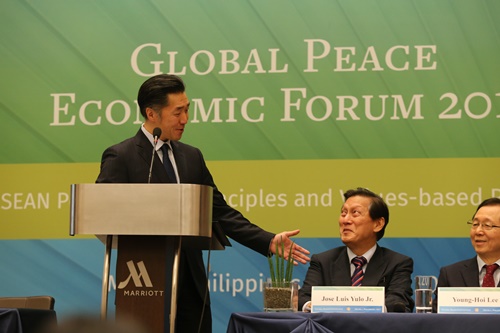
Dr. Hyun Jin Preston Moon thanks Jose Luis Yulo, President of the Chamber of Commerce of the Philippine Islands for their support in organizing the economic forum.
The essential question of how to deter bad behavior has two clear options: either government bureaucracy provides the regulating force; or conscientious ethical people self-regulate based upon universally recognized principles, values and norms because that is what the markets and society expects.
I believe the most effective approach is overwhelmingly clear to business leaders. Most will be more concerned about the markets and their consumer backlash than anything the government can do to their business.
Thus, in a perfect world, the markets themselves are the best means of regulation; for they dictate which businesses provide the best goods and services that society needs, in addition, to aligning to its values. If a business does not meet those market expectations, then it would no longer be competitive and eventually fail.
That is why, in the business community, we have all heard the truism that “the customer is king.”
It is the consumer of those goods and services who decide the fate of businesses as opposed to some kind of shady boardroom dealings by unscrupulous businessmen.
Changing Global and Technological Landscape
Ladies and gentlemen, there are no shortcuts in life. For there to be a sustainable, equitable and prosperous economic system, there must be people of conscience first, whose collective decisions advance the greater good as opposed to benefitting the few.
Their choices need to be rooted in universal principles and values that uplift the intrinsic God-given human rights and freedoms of all because it is in their self-interest to do so.
In other words, the markets, or their consumers, demand it. The overarching economic approach of the Global Peace Foundation, hence, calls for less government interference in the marketplace in line with the classic liberal economic principles with one very important addition – the development of societies in which the collective ethos is rooted on a universally accepted ethic that guides the national and global economic systems.
The overarching economic approach of the Global Peace Foundation, hence, calls for less government interference in the marketplace in line with the classic liberal economic principles with one very important addition – the development of societies in which the collective ethos is rooted on a universally accepted ethic that guides the national and global economic systems.Systems are values-neutral; it is people that infuse those structures with their unique values perspective leading to varying outcomes, whether good or bad. Technologies, too, are values-neutral.
In the right hands, technologies can provide miraculous solutions that enable people to live more healthy, fruitful and productive lives. In the wrong hands, however, technologies can cause conflict, insecurity, and financial loss that are hard to quantify. Still, technological advances can liberalize and democratize the markets by providing tools and information to an average consumer.
The overarching economic approach of the Global Peace Foundation, hence, calls for less government interference in the marketplace in line with the classic liberal economic principles with one very important addition – the development of societies in which the collective ethos is rooted on a universally accepted ethic that guides the national and global economic systems.Systems are values-neutral; it is people that infuse those structures with their unique values perspective leading to varying outcomes, whether good or bad. Technologies, too, are values-neutral.
The advent of the internet and social media provides access to real-time information across different time zones and regions which enable consumers to make more informed decisions about businesses, products and services.
It is essential that freer markets and technology, which are the bedrock of building a well-functioning economic system, are tempered by universal moral values as well as uncompromising adherence to fundamental human rights and common decency.
Vision for the Philippines
When leaders and citizens align to these principles and values, the nation can begin to realize its full potential to become a leading economic and moral force. I believe that the Philippines can and should become such a model nation.
Not only can it thrive economically for its own sake but it can also lead an effort to realize ASEAN’s full potential that also further stabilizes and promotes peace for the rest of Asia.
In this age of the Pacific Rim region, I believe the Philippines is well-positioned to become a central player of that growing Pacific Rim influence. The Philippines already possesses many key attributes to assume that role. It is strategically located, and has forged important ties with nations such as Korea, Japan, U.S. and China.
It has abundant natural resources, an attractive environment, and its English-speaking population is 100 million-strong.
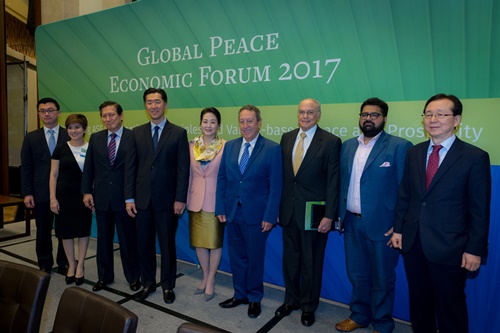
Panelists and moderators of the Global Peace Economic Forum 2017.
Many Filipinos already live abroad and are influencing the local affairs of their host nations. More importantly, I believe the Philippines can become a key trade and economic hub in the larger Pacific Rim region that is a gateway between East and West, whereby it offers distribution, professional services and manufacturing capabilities, among others.
By definition, a hub is a central part that connects multiple elements harmoniously. The Philippines has a unique history with multi-cultural, multi-religious and multi-lingual backgrounds, so its people can interact and connect with others naturally. This is an exciting and opportune time for the Philippines.
The 10 ASEAN member nations have a combined GDP of more than $2.6 trillion and a population of over 622 million in a strategically significant part of the world, whose relevance and weight will only increase in the coming years.
As the Philippines currently chairs ASEAN and hence sets the tone of its discourse, this is indeed a great opportunity for it to demonstrate moral and innovative leadership.
Additionally, the Philippines is on a positive trajectory. As announced at our morning session by our close partner, the Heritage Foundation, the Philippines has moved up twelve places in its Economic Freedom Index for 2017 .
That is a solid achievement! Please give the Philippines a well-deserved round of applause.
Opportunities and Challenges
Let us take a closer look at the Philippine’s economic and business landscape. From 2012 until now, the country has recorded a remarkable rate of growth. Aided by ongoing increase in consumer spending and infrastructure investments, the GDP growth for 2016 was at 6.8%, 2nd best in Asia behind India.
International agencies, including Moody’s, are projecting solid annual growth at around 6.5%. Reasonably low level of total foreign debt to GDP, coupled with good macro-economic fundamentals and robust economic growth are giving comfort to the international markets and rating agencies.
Philippines is also among the world’s top five minerals reserve countries, with mining permits currently given to cover only 2% of the reserve area, which promises enormous future revenue opportunities.
On the other hand, there are significant challenges. Chronic reliance on foreign consumers and capital goods forces the Philippines into a constant state of trade deficit. The lack of infrastructure, ranked at 95th among 138 nations by the Global Competitiveness Index, also continues to weigh down the country from reaching fuller economic potential.
The greatest challenges, however, are its inefficient government bureaucracy, crony capitalism, and corruption.
They prevent net value creation and discourage the spirit of innovation and entrepreneurism. Furthermore, they stifle the growth of quality jobs and the size of the middle-class, which lead to worsening income inequality between the rich and the poor. More than 50% of the population earns income of less than $2 a day and over 25% of the population lives in poverty, where over 60% of them live in remote areas away from developed cities.
The combination of these factors leads to crime and violence, social unrest and increasing number of those without a minimum level of care and education.
This is in stark contrast with the highest earners in the Philippines. According to the World Bank and Forbes Magazine, the collective personal net worth of the top 50 individuals was around $78 billion, which is about 25% of the country’s entire GDP. Their personal wealth increased about $8 billion year-over-year, representing a 50% GDP dollar growth during the same period.
When a country’s economy grows by 7% and the majority of that wealth increase is captured by less than a thousandth of a percent of the population, that kind of economic phenomenon is not only unsustainable but unjust. The growth that the nation enjoys is not trickling down to the broader population because people are not plugged into the growth areas of the economy. There are too many who are shut out of the necessary education and opportunity, and they are locked in a perpetual state of poverty and disadvantage.
Reforming the Philippines Economy: Liberalization of Financial Markets
This problem has to be addressed and resolved. To reduce wealth disparity while enlarging the pie for the entire population through sustained economic growth, a vibrant and robust working middle-class must take root and prosper.
When the few select elites control most of the wealth via a handful of large corporations, and the vast majority is disconnected from the economic drivers, it is essential that more quality jobs become available through more small businesses and entrepreneurial startups.
I believe the most effective way to jump start such a cycle and reach the desired end is through liberalization of capital and allowing easier financial access to small businesses, start-ups and new ventures. In essence, when capital flows freely, unhindered by unnecessary regulation or policy, into burgeoning economic opportunities, that leads to greater capital creation and results in the natural balancing of supply and demand.
That is why the Philippines financial institutions, with the support of government policies and aided by technology, should deploy more capital toward financing new growth and opportunity so that the brightest and most talented can achieve their dreams beyond the current limited landscape.
Of course, there are other pressing major economic issues and initiatives to tackle, such as infrastructure development, education and health services, and building manufacturing capacity. However, whereas these areas of investment involve the “hardware” needs of the country which can be readily addressed by securing the required capital from domestic or foreign sources, the collective mindset required for liberalizing capital is akin to developing the internal “software,” where such development could take generations to take root.
By their very nature, the financial industry and its governing regulatory bodies are bureaucratic, inefficient and risk-averse. Yet, if they are unable or unwilling to develop the necessary culture and the requisite competencies to proactively evaluate risk and reward, and are unwilling to execute on calculated bets then the country’s economy will suffer and it will eventually hit a ceiling. To illustrate this case in point, look no further than to Korea, my home country.
Korean Experience
South Korea, the 11th largest economy in the world, has seen its meteoric rise over the last 70 years, fueled by the growth of chaebols, or family-controlled business conglomerates. This leap to prosperity within one to two generations was unprecedented. Starting from the bottom in a devastated landscape after the Korean War in 1953, not only did Koreans catch up to developed nations within a short period of time, they took the lead in several key industries including automotive, construction, shipbuilding, electronics, high-tech communication, and internet services. Now, many look to Korea’s miracle on the Han River as a model with envy and respect.
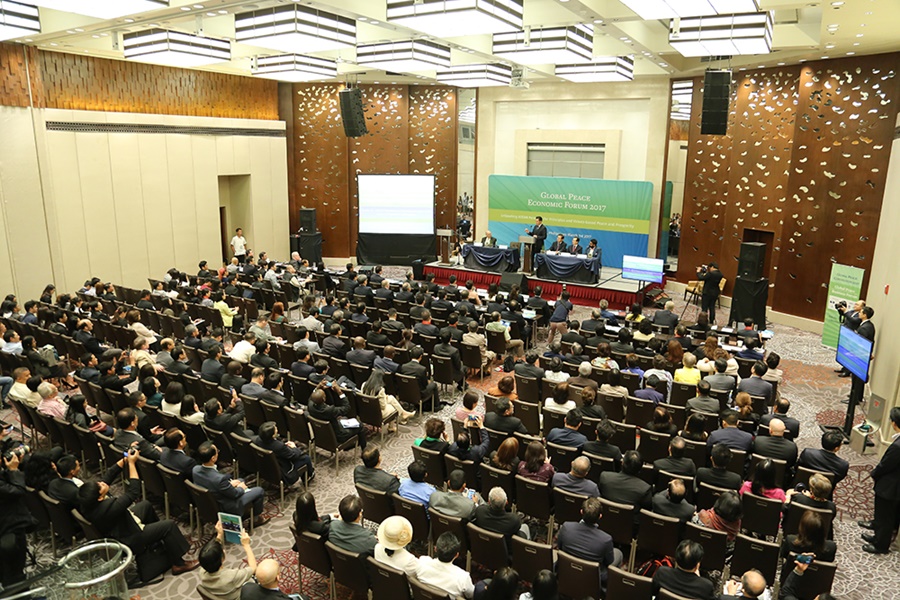
The Global Peace Economic Forum 2017 addressed regional development issues and the need for principles and values to undergird free market systems.
However, while seeking maximum growth in the shortest amount of time, the marriage of convenience and the moral hazard that was created between the South Korean government and the chaebols left behind a system and legacy that still favors the select few at the expense of the many.
Over the period of extraordinary growth in the last four decades, the Korean economy has become even more consolidated into the hands of fewer chaebols than ever before. Accounting for nearly all of Korean GDP, these chaebols dominate in every industry and market, hoarding profits and squeezing suppliers while stifling the growth of smaller businesses that employ 90% of the labor market.
Consumers are shortchanged by lack of competition, price manipulation, and corruption that follows any excessive consolidation of power. Most of all, the nation suffers as it is held hostage to the whims of a small elite group of chaebol families, suppressing opportunity, innovation, and entrepreneurialism and eventually hindering economic growth.
The outcome speaks for itself. The significant unemployment rate of those in their 20s to 30s is one example.
While Korea boasts one of the highest education standards of all developed countries, it also has one of the highest unemployment rates in this age group, at over 10%. In turn, growing negative sentiment toward the chaebols is reaching its climax, given the environment of economic exclusion rather than inclusion, where those with the political and business relationships have an unfair advantage, leaving the mass behind to compete over a shrinking pie.
You only need to look at the city of Seoul where over a million people gather in peaceful protest every weekend in order to express their discontent for the corrupt and rigged system in business and politics.
One should take notice when there is even a popular terminology called, “Hell Chosun,” in reference to the widespread perception that Korea, or its old name, Chosun, offers no hope and future for an average person unless one is born rich and connected.
The Korean experience should be a lesson for all emerging nations; there is no shortcut to a good sustainable outcome. There has to be sound fundamentals with which to build on; in this case, creating a more robust and growing middle-class of entrepreneurs and business owners through liberalization of capital.
This is made all the more discouraging because even the chaebols, who grew on the backs of the Koreans, are now losing their global standing and competitiveness to other more entrepreneurial and forward-looking players from China, India and others. In short, the Korean experience should be a lesson for all emerging nations; there is no shortcut to a good sustainable outcome. There has to be sound fundamentals with which to build on; in this case, creating a more robust and growing middle-class of entrepreneurs and business owners through liberalization of capital.
The Korean experience should be a lesson for all emerging nations; there is no shortcut to a good sustainable outcome. There has to be sound fundamentals with which to build on; in this case, creating a more robust and growing middle-class of entrepreneurs and business owners through liberalization of capital.
Even the chaebols will benefit from this in the long run because this will force them to adapt to a more competitive landscape, leading to greater market discipline, fair-play, and sustainability.
The consumers will of course benefit because of the improved products, services and prices. This is what the ideals of the free market and capitalism should look like; a win-win for all sides. As for the Philippines, it is now in the process of developing itself into a more industrialized country.
As it looks for ways to grow economically stronger and become more relevant in the world stage, it needs to envision a new economic paradigm. With a new mindset it should seek solutions that can unlock the potential of the Philippines and ASEAN. As observed in Korea’s situation, a country may have all the necessary hardware, such as infrastructure, financial capital and technology, but still stagnate and wither very quickly.
Philippine business and political leaders should cultivate a spirit of entrepreneurism, creativity, individual responsibility and ownership. The country should not fall into the current default state where the government and a few corporations drive all the growth.
That is neither sustainable nor desirable. Instead, the entire system needs to be engaged in the creative growth process together.
I urge all of you to join me and the Global Peace Foundation to be the problem solvers and the change makers who can tackle the biggest issues and challenges facing our world today, and to leave a better, peaceful world for our descendants.
The key is lowering the barrier of entry into the market and stimulate free competition by efficiently connecting capital with opportunities. The government’s role is to ensure that there would be fair play by enacting laws which protect all its citizens in a free market landscape; then, to step back and let the market forces determine the outcome.
I urge all of you to join me and the Global Peace Foundation to be the problem solvers and the change makers who can tackle the biggest issues and challenges facing our world today, and to leave a better, peaceful world for our descendants.
It should never choose winners and losers or get embroiled in the trap of over-regulation. Laws should be simple but enforced vigorously so that the ideal of “rule of law”—that is the foundation upon which true free markets are built– can start to take hold here in the Philippines and the rest of Asia.
Conclusion
Distinguished guests, ladies and gentlemen,
We have gathered at a momentous time in history in the Philippines that will play a major role in shaping the economy, security and peace for the entire region and the world. Our collective leadership going forward will be critical as it will leave a lasting legacy with profound and broad global implications.
As leaders, we need to be always thinking long term and in the best interest of the whole based on the universal principles and values. Whether in business, economy, politics, civic, or religion, it is the leaders who will set the tone and the direction.
It is therefore critical that we become moral and innovative leaders who can chart the new course for this nation to reach its greatest potential.
I urge all of you to join me and the Global Peace Foundation to be the problem solvers and the change makers who can tackle the biggest issues and challenges facing our world today, and to leave a better, peaceful world for our descendants.
May God bless you and your families. Thank you very much.

